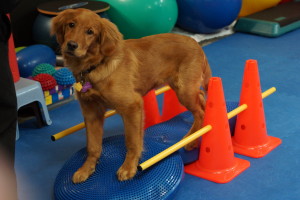In recent years, as dog sports gain more and more enthusiasts, trainers have started turning their attention toward how to create a better canine athlete. One that is stronger, faster, and less likely to get injured. Canine conditioning training is the answer.

What is Canine Conditioning Training?
While it is jokingly referred to as “doggy yoga” because of the use of yoga equipment and some of the positions the dog’s are put into resemble human poses, it would be more accurate to compare it to human conditioning training. And it’s no joke. Human athletes train for months to condition their bodies for whatever sport they participate in – swimmers lift weights to strengthen their muscles, football players cross train to keep their bodies balanced and build up stamina. And every single athlete on the planet has a stretching routine before they compete. Why should your canine athlete be any different?
Bobbie Lyons, Cert CF (Canine Fitness), has been teaching K9 Conditioning since 2006. Her border collie Force has a rotated pelvis, making him more prone to injuries while competing in agility. Lyons’s quest to find ways to help him strengthen his back-end to make agility safer and less painful, led to the discovery of the importance of yoga-type stretches and workouts for dogs.
Classes in canine conditioning teach dogs body awareness – where to place their feet, how to use different muscles to perform tasks – while strengthening muscles they will need to use for high powered sports or everyday life.
Can Any Dog Do It?
Any dog can do canine conditioning training, whether or not they are going to be competing in a sport. In fact, even if your dog is just a family pet, they could benefit from doggy yoga. After all, the family pet chases cats or balls once in a while; conditioning helps prevent injuries regardless of what your dog is doing for physical exercise. The following are dogs who can particularly benefit from a K9 conditioning program tailored to their needs:
- Suffer from arthritis, hip dysplasia, MPL, or other joint related issues
- Have genetic problems that affect the way they move
- Are recovering from any type of muscle, ligament, or tissue injury
“Dogs 12 weeks to 12+ years benefit from the mental and physical aspects of K9 Yoga or pup-pilates.” Lyons explains, “The duration and amount of repetitions is adjusted for age, weight, current levels of strength and/or previous injury.”
Another benefit is confidence building. Puppies and dogs who are anxious about their environment and every day experiences like walking on different surfaces, being handled, climbing or stepping, can build confidence in those area while strengthening their muscles. Many a puppy has entered a K9 Conditioning class on the first day not wanting to their feet touched or to go near the fitness equipment, only to be offering their paws for a shake and straining on the leash to get on the peanuts by the end.
Doing It Right
While it’s tempting to rush to the nearest sporting goods store, buy a balance disc and put your dog on it, don’t. Workouts done wrong can cause injury.
First, consult your vet to find out if your dog has any limitations on what he can do. Then, contact a trainer specializing in canine conditioning. Bobbie Lyons teaches online classes through Daisy Peel, so you can learn from her how to work out your dog from the comfort of your own home.
Choosing exercises that fit the individual dog and the activities the dog participates in is key. These factors need to be taken into consideration when doing any type of exercise or strength training.
- Age and weight of the dog,
- Physical condition of the dog,
- Performance activities of the dog,
- Physical conditions or limitations of both the handler and the dog.
It is important to know your dog’s limitations as well as be aware of how they are distributing their weight before starting a K9 Conditioning Program. Lyons can help her students figure this out in her classes, workshops, and seminars. (http://www.pawsitive-performance.com)
About the Author
Based in Tustin, Calif., animal lover Kristina N. Lotz is a Certified Professional Dog Trainer – Knowledge Assessed (CPDT-KA) and works as a full-time trainer. She also owns her own custom pet products company, A Fairytail House, where she makes personalized collars, leashes, beds, keepsake pillows and blankets, and anything else your imagine can think up. In her spare time, she trains and competes in herding, agility, obedience, rally, and conformation with her Shetland Sheepdogs.

